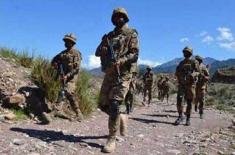
- Home
- Pakistan
- PMD warns of unprecedented dengue outbreak risk amid flooding and post-monsoon conditions
PMD Warns Of Unprecedented Dengue Outbreak Risk Amid Flooding And Post-monsoon Conditions
Muhammad Irfan Published September 16, 2025 | 02:30 PM

ISLAMABAD, (UrduPoint / Pakistan Point News - 16th Sep, 2025) The Pakistan Meteorological Department (PMD) has issued a high-risk dengue alert, warning that Pakistan faces an unprecedented threat of a severe outbreak beginning September 20 due to favorable weather conditions combined with the devastating effects of monsoon flooding.
In its alert, PMD highlighted that dengue fever has remained a persistent public health threat in Pakistan over the last decade, with major outbreaks reported during the post-monsoon season from September 20 to December 5. Scientific analysis shows that dengue risk is at its peak when temperatures remain between 26–29 C for three to five weeks, relative humidity exceeds 60 percent, and rainfall surpasses 27 millimeters with a lag effect of up to three weeks.
The Aedes mosquitoes responsible for dengue transmission are most active two hours after sunrise and two hours before sunset, while their breeding activity slows only when temperatures drop below 16 C.
Currently, Pakistan is facing severe and widespread flooding due to heavy and prolonged monsoon rains, river overflows, and water releases from reservoirs. Large parts of Punjab and Sindh, including urban centers, are inundated; villages remain submerged, millions of people are displaced, and shelters are overcrowded. The floods have left behind stagnant water and poor drainage systems, creating highly favorable environmental conditions for mosquito breeding and dengue transmission.
Based on historical trends, the prevailing climate outlook, and the flood-related inundation, PMD cautioned that conditions have become highly conducive for dengue onset starting September 20. This season, it warned, poses an exceptionally high risk of a severe dengue outbreak, particularly in ten major cities—Karachi, Lahore, Islamabad, Faisalabad, Sialkot, Rawalpindi, Peshawar, Sukkur, Hyderabad, and Multan—as well as across flood-affected regions nationwide.
The department strongly advised all stakeholders, including district administrations, health departments, and the general public, to immediately adopt pre-emptive measures to counter the looming risk. It stressed that national health agencies and dengue control centers must remain on high alert, enhance the preparedness of healthcare facilities, and intensify vector control operations without delay.
For health departments, local authorities, and dengue control centers, PMD recommended close monitoring of environmental and meteorological data to track dengue risk windows. It urged widespread fumigation, spraying of larvicides, and clearing of blocked drains and stagnant water, particularly in flood-hit areas.
It further advised that mosquito control and sanitation measures should be integrated into all flood relief operations and shelter management. Public awareness campaigns through television, radio, mosques, social media, and local community leaders should be launched at scale to educate citizens about prevention and the importance of early medical consultation.
Coordination with national and provincial disaster management authorities was also emphasized to ensure that flood relief shelters and camps remain as clean and dry as possible, with proper arrangements for water supply and sanitation to prevent mosquito breeding.
For the general public, PMD advised immediate household-level precautions. Residents should remove or empty containers that collect water, such as old tires, buckets, debris, or tarpaulins, and ensure water storage containers are properly covered.
The use of mosquito repellents, nets, and coils is strongly recommended, particularly during early morning and late afternoon hours when dengue mosquitoes are most active. People are also encouraged to wear long sleeves and trousers when outdoors, and to keep doors and windows screened or closed where possible.
In flood-affected or evacuated areas, PMD stressed that maintaining hygiene is critical. Residents and relief workers should avoid stagnant water around tents or shelters, use only treated or boiled water, and keep their surroundings clean to minimize the risk of mosquito breeding and dengue transmission.
The Pakistan Meteorological Department called for urgent, coordinated national action to prevent a potential public health emergency. It advised all stakeholders to remain vigilant and consult its official website www.pmd.gov.pk for continuous updates and official guidance.
Recent Stories

Arab Parliament welcomes outcomes of Arab-Islamic Emergency Summit in Doha

Samiya Hijab clarifies deal speculation after forgiving accused

Punjab makes septic tanks mandatory for all housing societies, plazas

Luxembourg to recognise State of Palestine

Five security officials including captain martyred in Balochistan: ISPR

PM Shehbaz Sharif may Meet Trump on Sept 25

‘Al Bait Al Emarati’ showcases UAE heritage in China

ICC rejects Pakistan’s request to remove match referee for India clash

Tabreed shareholders approve interim dividend of 6.5 fils per share for H1

UAE national futsal team to face Malaysia in Asian Cup qualifiers

Study warns childhood high blood pressure linked to adult heart disease

Governor of CBUAE participates in 85th Meeting of GCC Central Bank Governors Com ..
More Stories From Pakistan
-
Old man killed over old enmity
6 minutes ago -
Security arrangements reviewed for ongoing anti-polio drive
6 minutes ago -
Dera police foil smuggling bid, recover arms, narcotics
6 minutes ago -
Wellness Warriors Dhirkot prove how small efforts create big impact
6 minutes ago -
Identity is birthright, not a privilege: Spokesperson NADRA
6 minutes ago -
PMD warns of unprecedented dengue outbreak risk amid flooding and post-monsoon conditions
6 minutes ago
-
Training session on emergency medical response held
6 minutes ago -
Distt admin, traffic police move to end parking woes at Pak Secretariat
16 minutes ago -
IRSA releases 251,300 cusecs water
16 minutes ago -
PM Shehbaz Sharif’s Doha address garners widespread praise for actionable solutions of Middle East ..
36 minutes ago -

Samiya Hijab clarifies deal speculation after forgiving accused
41 minutes ago -
Two brothers killed during clash between two groups
47 minutes ago
